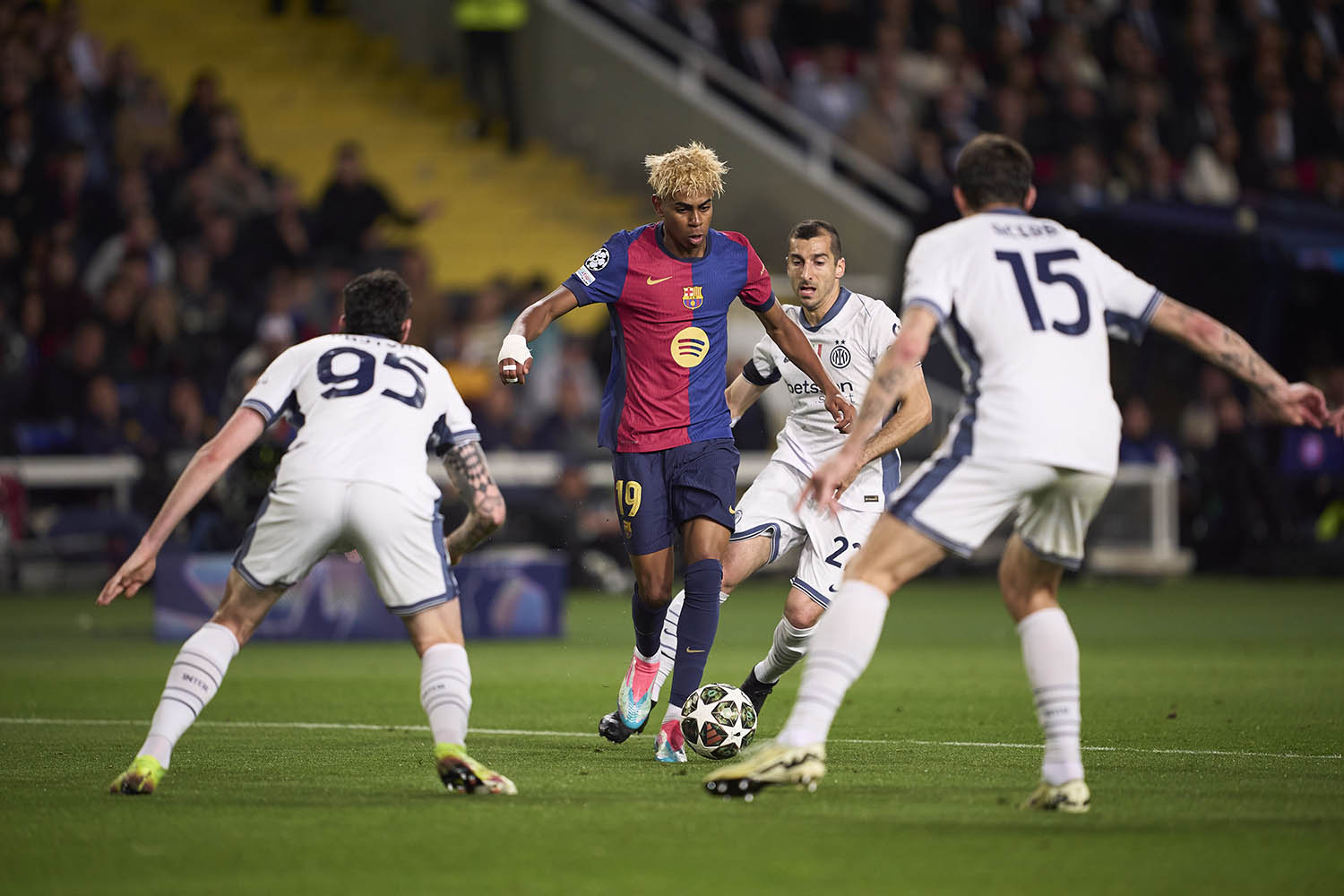The records fall so often now that even Lamine Yamal no longer really seems impressed. Another two fell on Wednesday night: the youngest player to score in a Champions League semi-final, and the youngest player to make 100 appearances for Barcelona. Presented with a commemorative shirt to celebrate the latter, the 17-year-old barely mustered a smile.
In truth, the novelty of the extraordinary has probably long since worn off. Yamal was already – deep breath – the youngest player to play for Barcelona, to score in La Liga, to start a Champions League game, to play for Spain, to feature in the European Championship, to score in the European Championship, to win a major international trophy. He is, by this stage, rapidly approaching that territory where he might break the record for most records broken.
If that sounds familiar – if it feels like that line has been delivered before in praise of another Barcelona prodigy – then it is probably best not to mention it. Barcelona’s staff and executives tend to bristle just a little when Yamal’s name appears too close to that of Lionel Messi. Yamal does not appreciate it, either. “I don’t think the comparison makes sense,” he said this week. “I try to forge my own path.”
That is a reasonable approach: Messi is neither an especially fair nor a realistic parallel to draw for a teenager still at the dawn of his career.
Messi’s legacy is to have redefined football’s bar for greatness; such is Yamal’s promise that it is the only available context in which he can be placed.
‘I haven’t seen a player like him in eight or nine years... a talent of the type born every 50 years’
‘I haven’t seen a player like him in eight or nine years... a talent of the type born every 50 years’
Simone Inzaghi
That promise, his undeniable shimmering brilliance, is the primary explanation for Yamal’s staggering rise. Simone Inzaghi, the Inter Milan coach, seemed just a little awestruck by his encounter with the teenager on Wednesday. “He is a player I had not seen live before,” he said. His tone indicated he felt genuinely privileged to have done so at last. Perhaps that explains why some of his praise went just a little overboard. “I haven’t seen a player like him in eight or nine years,” he said, at first. A few minutes later, he was describing him as “a talent of the type born every 50 years”, which does rather rely on forgetting the entire existence of Messi. Still, it is easy to sympathise: truly “special” players, to use Hansi Flick’s adjective, can bring out the childlike wonder in even the most discerning observers.
Few, though, would quibble with Inzaghi’s assertion that Yamal is “difficult to stop”. He was thinking of opposing defenders as he said it, but it might also apply to those coaches charged with curating his development. They have a duty of care, of course, not to rush something so precious. But they have a responsibility, too, not to inhibit it more than necessary.
It would be wrong, though, to ignore the context in which the 17-year-old emerged, playing both for a Barcelona seeking an heir to Messi on the field – someone who might deliver the titles and trophies that the club crave and the fans expect – and one in desperate need of what American sports know as “the face of the franchise” off it.
Barcelona’s president, Joan Laporta, has already mortgaged off a substantial portion of the club’s future to raise funds for the present. Nobody in Catalunya is under any illusions that a bankable star might make a notable difference to the club’s parlous finances.
These are not circumstances in which Barcelona have any incentive to take things slowly.
Newsletters
Choose the newsletters you want to receive
View more
For information about how The Observer protects your data, read our Privacy Policy
Not, in fairness, that Yamal has given anyone reason to believe that such discretion might have been necessary. As Flick noted, the gauge of Yamal’s virtuosity is not just in the things he does, but in the stages on which he chooses to do them.
He scored in his first Champions League semi-final. He scored in the semi-final of Euro 2024 last year. He has played in three Clásicos this season, and scored in two of them. “He does it always in the big games,” Flick said.
But that does not mean that his steep trajectory does not bring with it a risk. Barcelona do not need to look far for evidence of that.
Pedri, sparkling in midfield for Flick’s team against Inter, emerged to similar frenzied acclaim.
He played 53 times for the club in his first season with the senior team. He won international recognition, too, playing almost every minute as Spain reached the semi-finals of Euro 2020.
For reasons that are still entirely mystifying, he was then selected for the country’s Olympic squad. In total, he played almost 4,000 minutes of football in less than a year.
Correlation is not, of course, causation, but it is hard not to draw a line between that and what happened next. Pedri was beset by fitness issues, hamstring problems, for vast swathes of the next three seasons; this is the first campaign since 2021 when he has been consistently present.
The case of Gavi, his frequent midfield partner, is less clearcut, but it carries a cautionary note, too: the 20-year-old played relentlessly in the two years after he broke into Barcelona’s first team, and then missed almost an entire year after tearing the anterior cruciate ligament in his right knee.
Between them, they offer perhaps the best rationale for why Yamal – and Barcelona – are right to resist the comparisons with Messi. He suffered with injuries early in his career, too, but underrated among his long list of qualities was his durability. If the parallel is to hold, Yamal will have to be present: not for a couple of seasons, but for more than a decade.
A statistic emerged this week, used as proof of Yamal’s incipient greatness. Messi played only nine times for Barcelona before he turned 18. Yamal has already hit 100. It is hard to tell, though, whether that should be seen as a good start, or one that is just a little too fast.
Photograph Manuel Queimadelos/Getty Images

